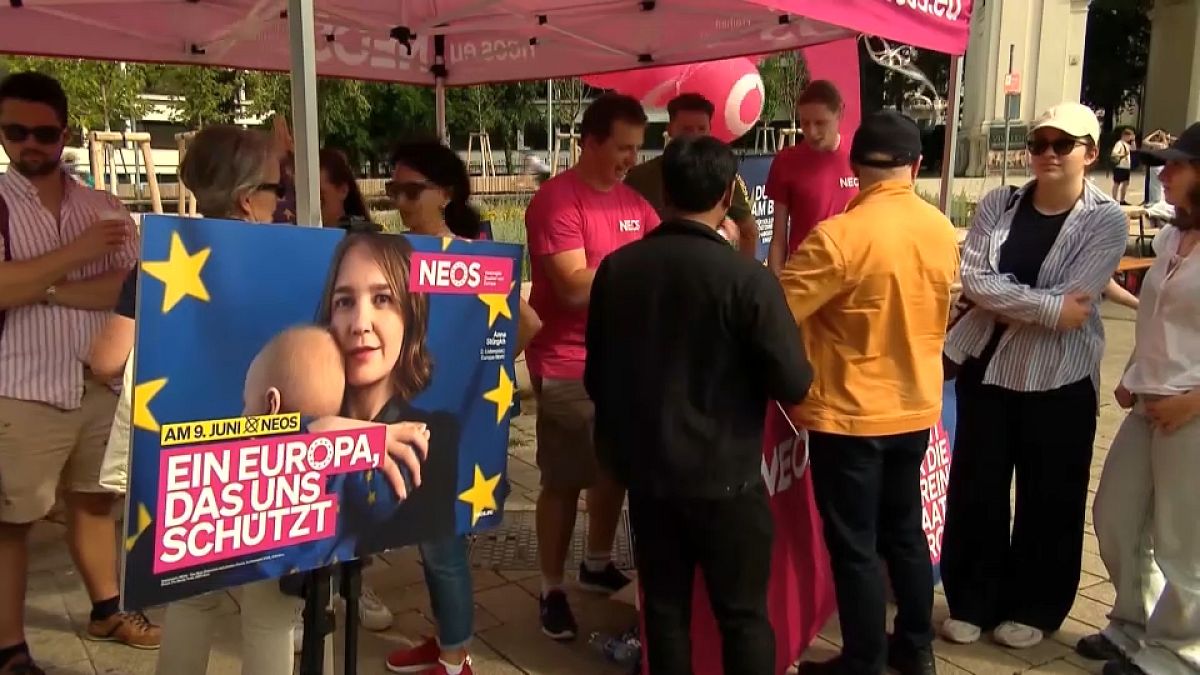Four main parties are in the running this year and Austria elects 20 MEPs to the parliament, up from the 19 seats it had in the last election in 2019, due in part to the UK’s 73 seats being partially redistributed following its withdrawal from the union.
Austrian parties aiming for seats in the European Parliament have held their final campaign events ahead of voting on Sunday in the EU elections.
The conservative People’s Party – the OeVP – was the winner in the last EU elections in 2019, winning seven seats.
The party’s candidate this time around is Reinhold Lopatka and he’s aiming big. He has said he is aiming to take the most seats in parliament this year and aims to make the centre-right European People’s Party – the EU parliament bloc to which the OeVP belongs – the premier alliance in Europe.
He’s also said that cooperation at European level with another Austrian party, the Austrian Freedom Party, is impossible.
“The Freedom Party is isolated in Europe. The opposite of what is needed to achieve something for Austria. You can’t be isolated. You need a network,” he said.
“I don’t have an enemy image of the European Union. I have an image of a friend. And we need friends for the major challenges so that we can solve them together.”
But the Austrian Freedom Party has been leading in the polls and is predicted to take more seats, which could push Lopatka’s OeVP into second place.
Lopatka has expressed anti-immigration views and said the rising number of Muslims in Austria has “completely changed our society”.
The Austrian Green Party lead candidate Lena Schilling has become something of a tabloid star in Austria in recent weeks.
The 23-year-old former climate activist was at the centre of a media storm for several weeks after one of Austria’s leading newspapers published text message she sent to a friend saying she “hated no one as much as the Greens”.
The paper went on to allege that Schilling planned to toe the party line until she was elected lead candidate, after which the party wouldn’t be able to “do anything anymore”.
Schilling explained that the messages were jokes and was simply her questioning whether as a leftist activist the Greens was the right party for her.
But despite the explanation, some political journalists say the press furore has damaged her credibility, with some voters saying they wouldn’t vote for her anymore.
Schilling has been vocal in her criticism of what she calls “lame excuses” from politicians not to address the underlying causes of the climate crisis.
“We know that proper climate protection, good social policy, a feminist Europe can only be achieved with the Greens and we will fight for it until the end,” she said at a campaign event in Vienna.
But the newcomers on the political scene this year are the DNA party, short for Democratic, Neutral, Authentic.
Their lead candidate is Maria Hubmer-Mogg who became well-known in Austria for her anti-lockdown and anti-vaccination stance in the wake of the coronavirus pandemic.
She was able to avoid disciplinary proceedings by the medical association by stepping down from working as a doctor, quitting her practice in Graz.
The right-wing populist DNA party has campaigned on an anti-establishment platform and says it aims to counter World Health Organization influence, push for a tougher asylum policy and stop the Austrian national bank’s digital currency.
Four main parties are vying for EU parliament seats this year.
Austria elects 20 MEPs to the parliament, up from the 19 seats it had in the last election in 2019, due in part to the UK’s 73 seats being partially redistributed following its withdrawal from the union.

